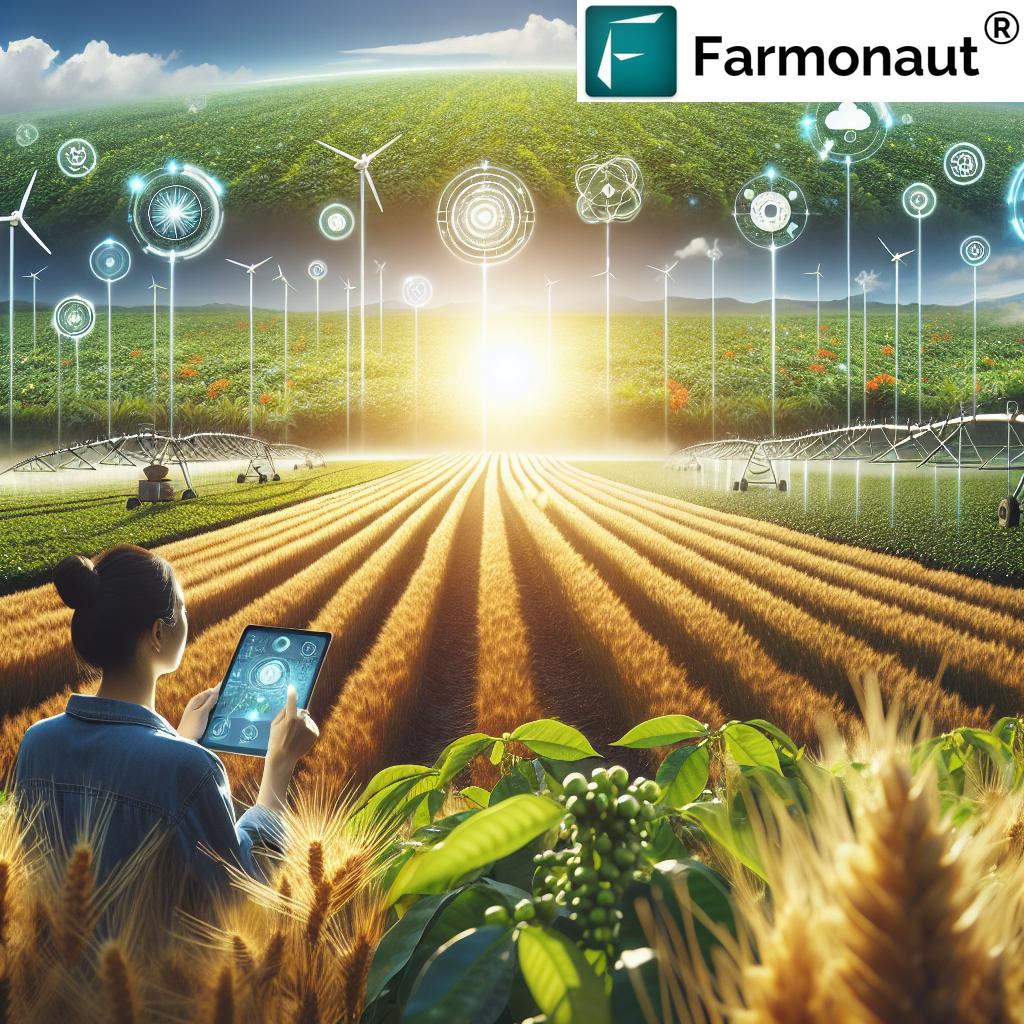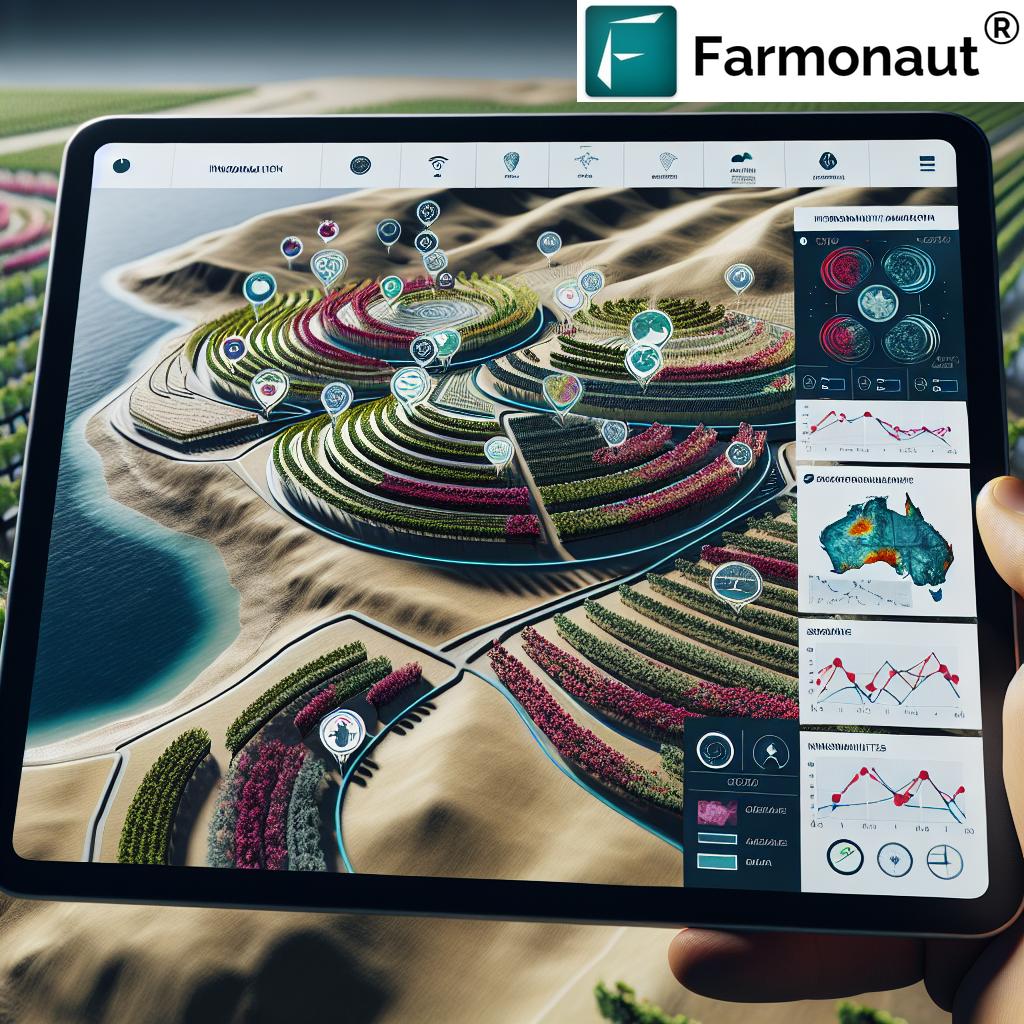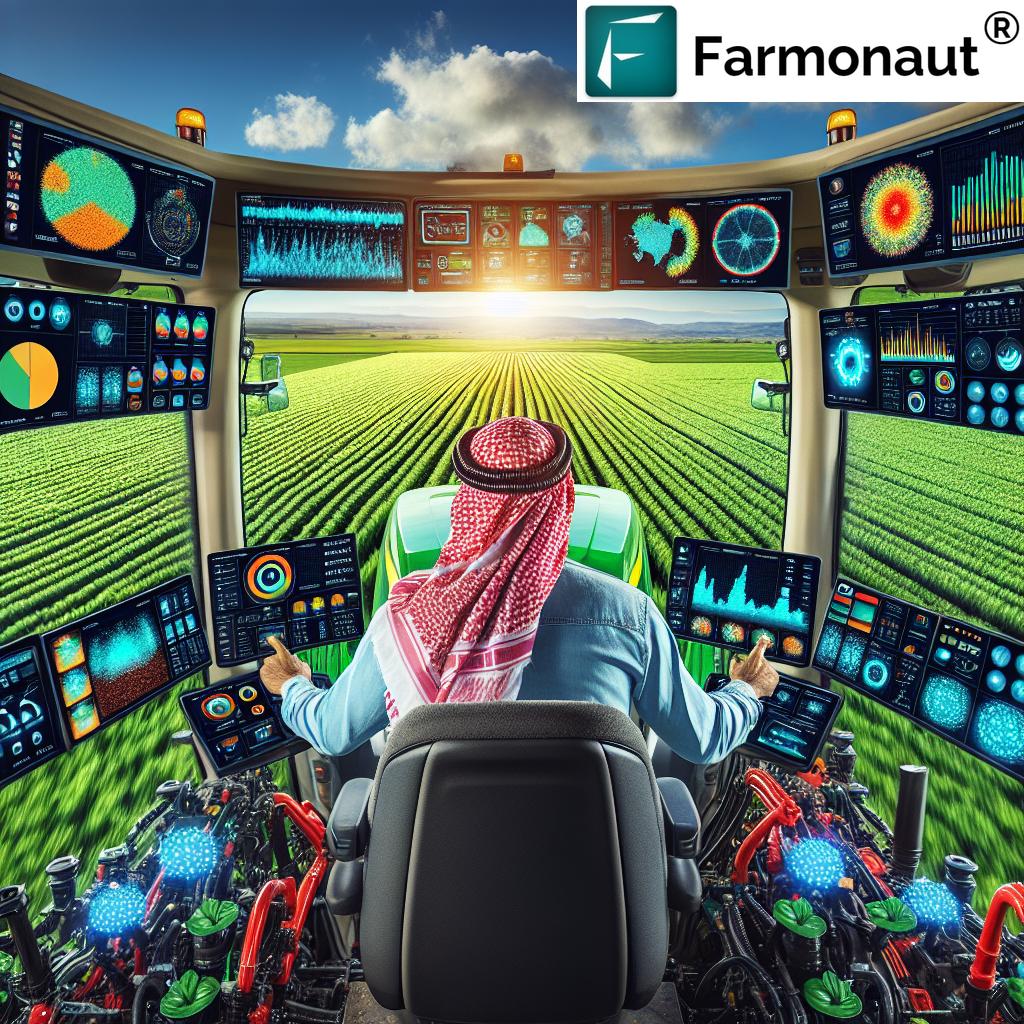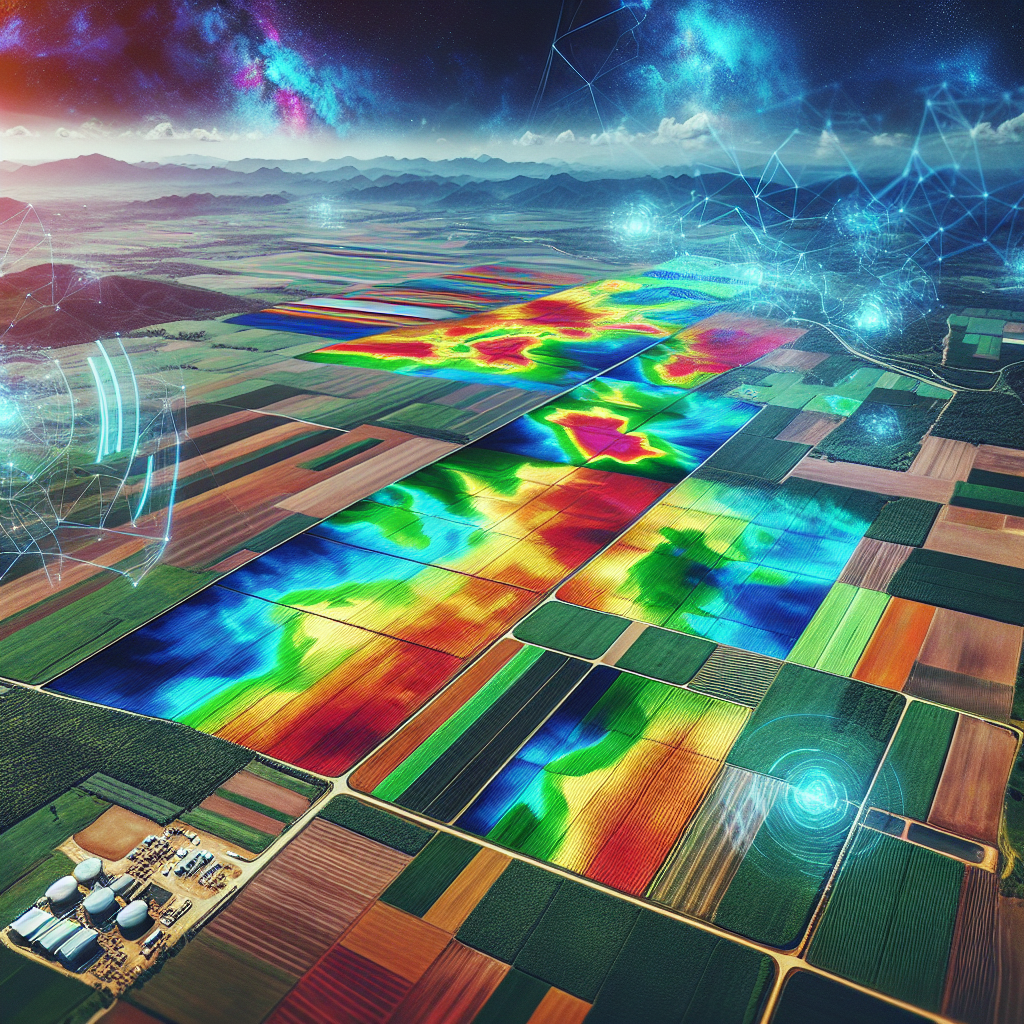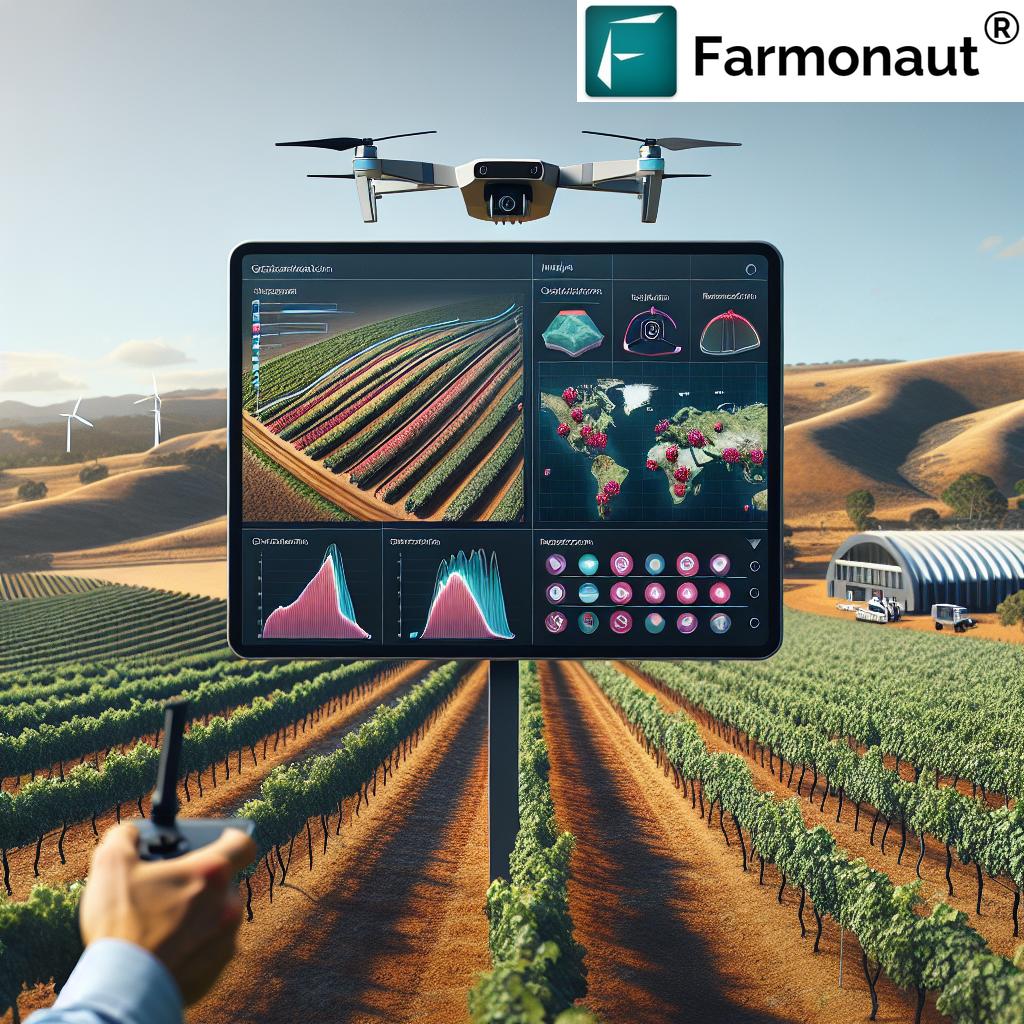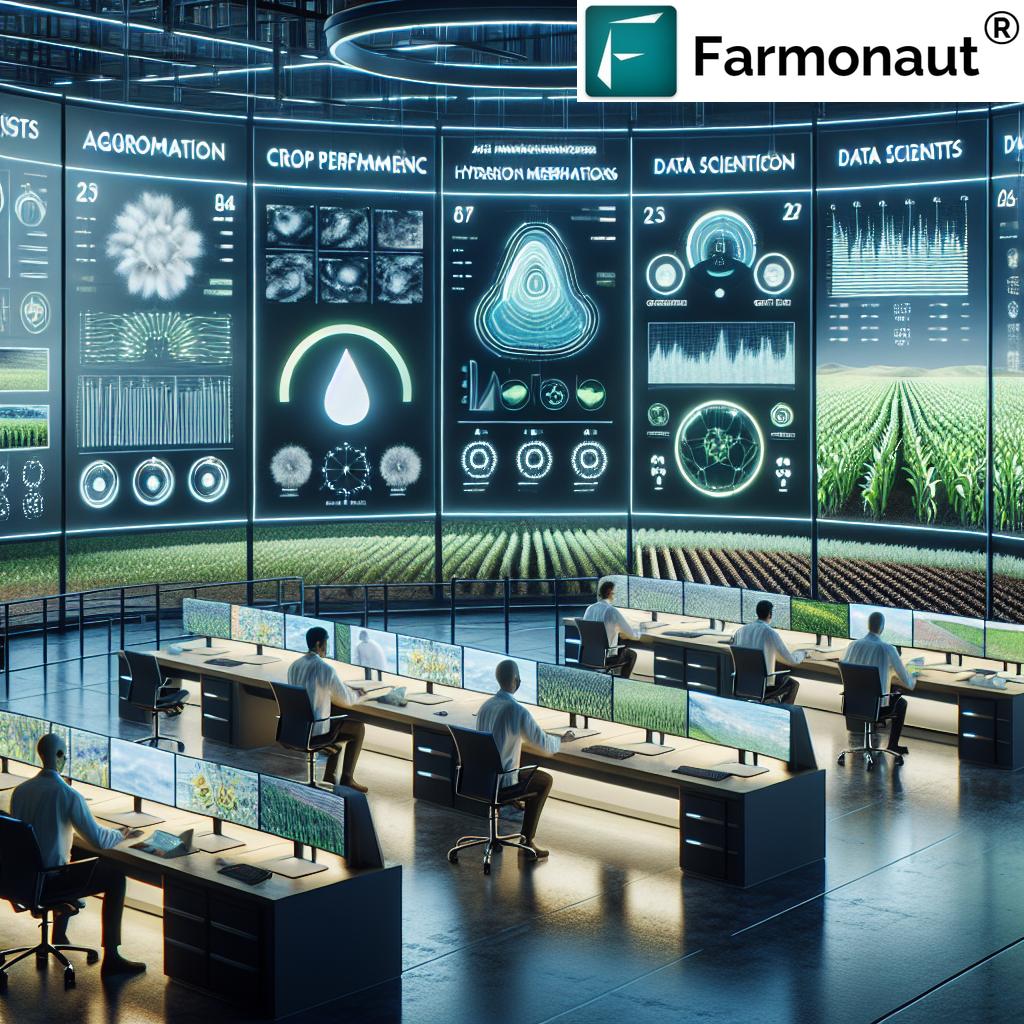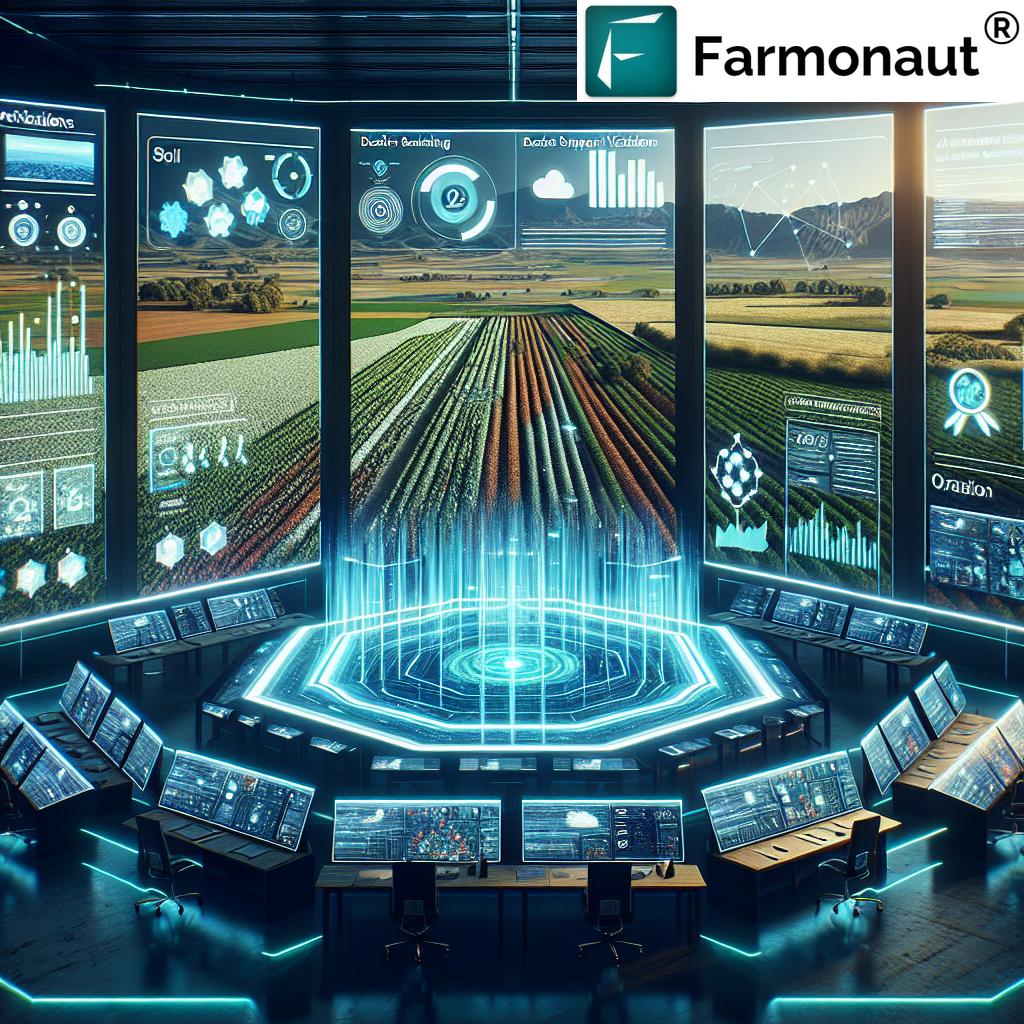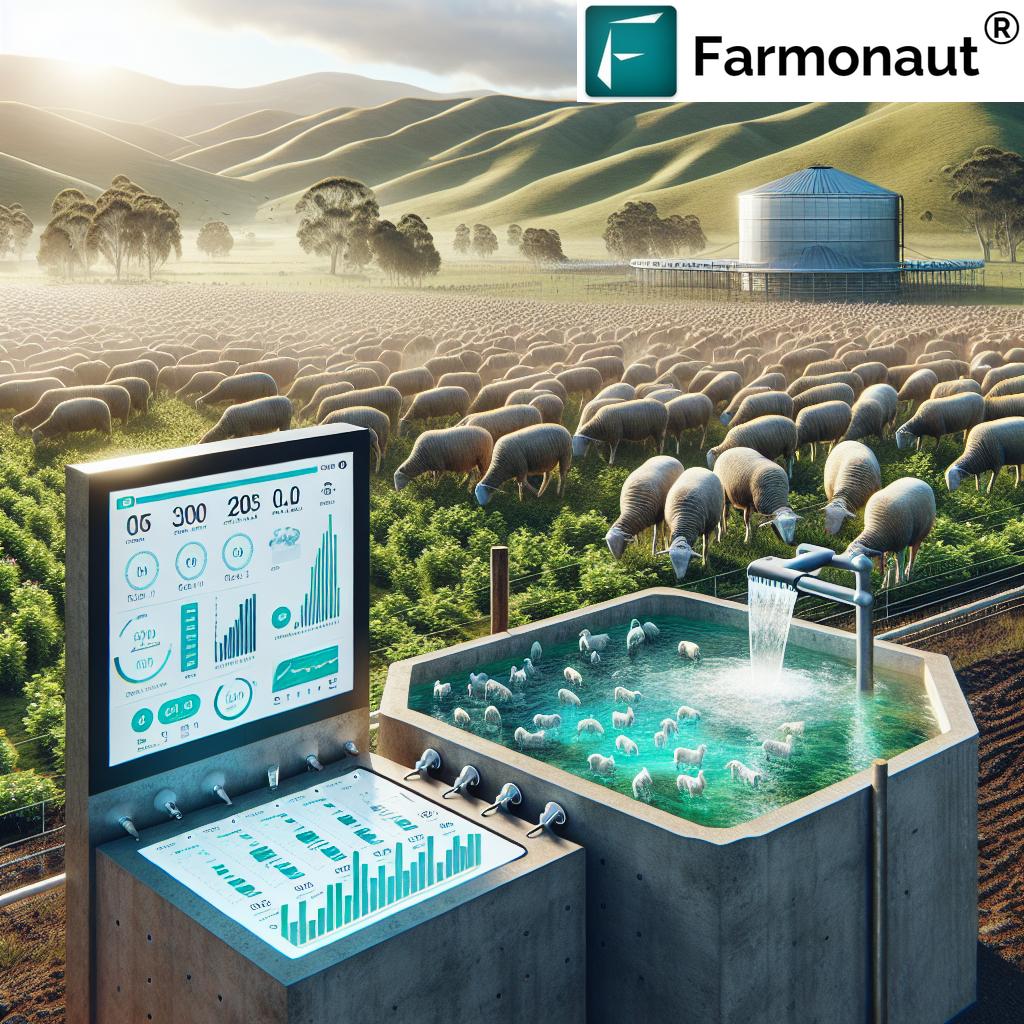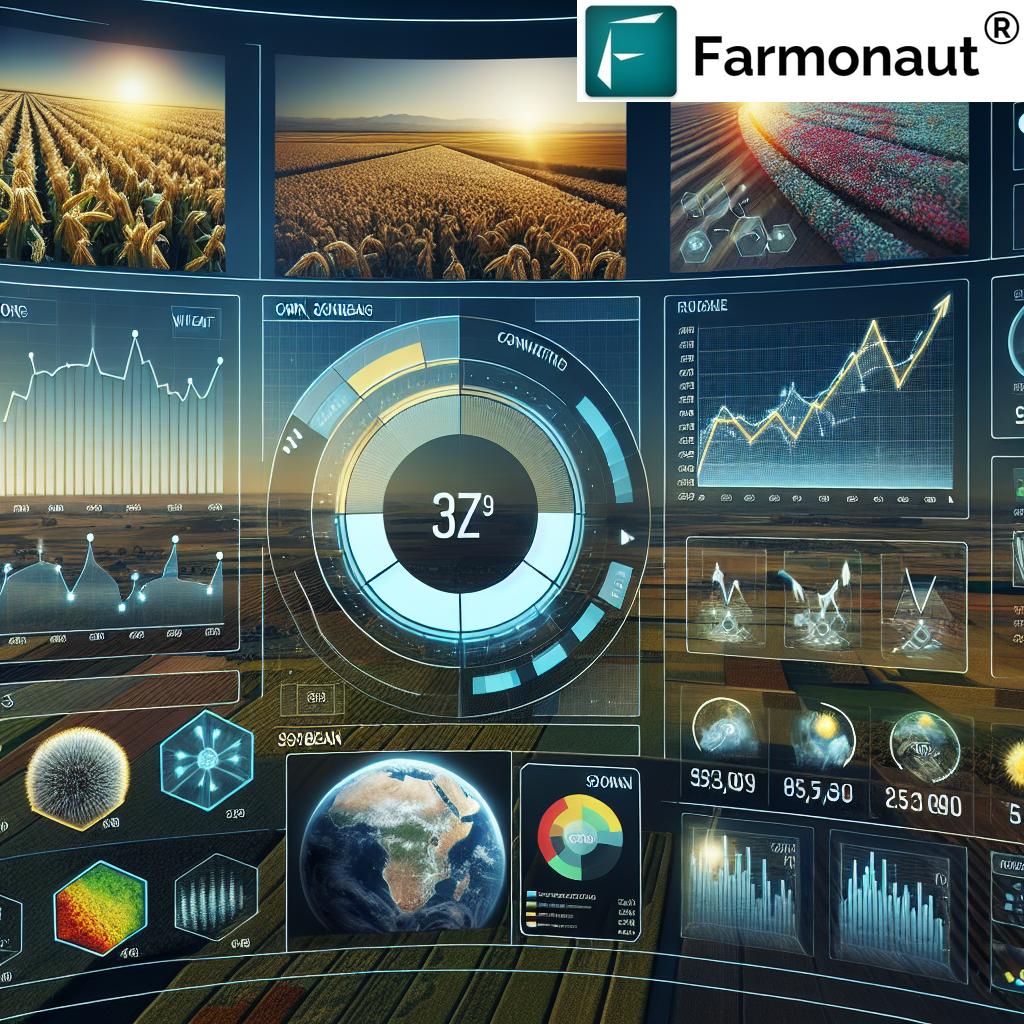Revolutionizing Sustainable Agriculture: How Farmonaut’s Precision Farming Technology Transforms Food Production in 2024
“In 2024, precision farming technology is expected to reduce agricultural water usage by up to 30% globally.”
As we delve into the transformative landscape of sustainable agriculture in 2024, we find ourselves at the forefront of a revolution that is reshaping the way we produce, distribute, and consume food. In this comprehensive exploration, we’ll uncover how innovative technologies and forward-thinking strategies are not only addressing the challenges faced by retailers and food brands but also paving the way for a more sustainable and efficient future in food production.
At the heart of this agricultural renaissance is Farmonaut, a pioneering agricultural technology company that is making waves with its advanced, satellite-based farm management solutions. By integrating cutting-edge technology with traditional farming practices, Farmonaut is spearheading the movement towards more sustainable and productive agriculture.
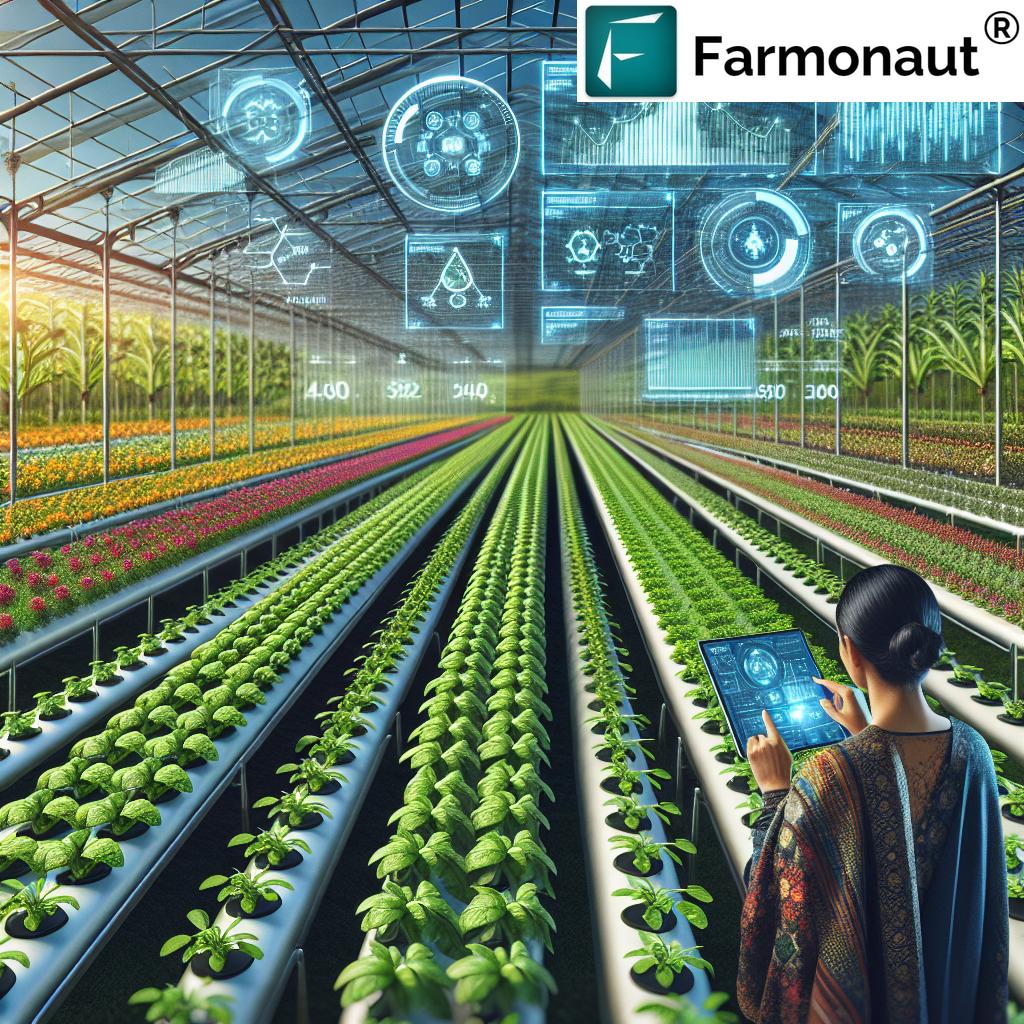
The Rise of Sustainable Agriculture Practices
In 2024, sustainable agriculture practices have become more than just a trend; they’re a necessity. As consumers become increasingly aware of the environmental impact of their food choices, retailers and brands are adapting to meet these new demands. Let’s explore some of the key sustainable agriculture practices that are transforming the industry:
- Precision Farming Technology: At the forefront of sustainable agriculture is precision farming technology. This approach uses data-driven insights to optimize resource use, reduce waste, and increase crop yields. Farmonaut’s satellite-based crop health monitoring system is a prime example of this technology in action.
- Climate-Smart Agriculture: With climate change posing significant challenges to food production, climate-smart agriculture techniques are gaining traction. These methods focus on increasing productivity while adapting to and mitigating climate change effects.
- Regenerative Farming: This holistic approach aims to improve soil health, increase biodiversity, and enhance ecosystem services. It’s gaining popularity among both small-scale farmers and large agribusinesses.
- Water Conservation Techniques: As water scarcity becomes a growing concern, innovative irrigation systems and water management practices are being implemented to reduce water usage in agriculture.
Farmonaut’s technology plays a crucial role in implementing these sustainable practices. By providing real-time data on crop health, soil moisture levels, and other critical metrics, Farmonaut enables farmers to make informed decisions that optimize resource use and minimize environmental impact.
Omnichannel Retail Strategy: Bridging the Gap Between Online and In-Store Experiences
In the ever-evolving retail landscape of 2024, the line between online and offline shopping experiences has become increasingly blurred. Retailers and food brands are adopting omnichannel strategies to provide seamless shopping experiences across all channels. Here’s how this trend is shaping the industry:
- Integrated Online and Offline Experiences: Retailers are creating cohesive experiences that allow customers to move effortlessly between online platforms and physical stores.
- Mobile-First Approach: With the growing prevalence of smartphones, retailers are optimizing their digital presence for mobile users, offering features like mobile ordering and in-store navigation.
- Personalized Shopping Experiences: By leveraging data analytics, retailers can offer personalized product recommendations and targeted promotions across all channels.
- Click-and-Collect Services: This hybrid model allows customers to order online and pick up in-store, combining the convenience of online shopping with the immediacy of in-store purchases.
While Farmonaut’s focus is on the production side of agriculture, its technology indirectly supports these omnichannel strategies by ensuring a steady and reliable supply of high-quality produce. This consistency is crucial for retailers implementing complex omnichannel systems.
Innovative Food Waste Reduction Techniques
Food waste is a significant concern in the retail and food production industries. In 2024, we’re seeing a surge in innovative techniques to combat this issue:
- AI-Powered Inventory Management: Advanced algorithms help retailers predict demand more accurately, reducing overstocking and minimizing waste.
- Upcycling Food Waste: Brands are finding creative ways to use food byproducts and imperfect produce in new products.
- Smart Packaging: Developments in packaging technology help extend the shelf life of products and indicate freshness more accurately.
- Collaborative Platforms: Apps and platforms connecting retailers with food banks and charities to redistribute surplus food are becoming more prevalent.
Farmonaut’s precision farming technology contributes to waste reduction at the source by helping farmers optimize crop yields and harvest timing. This ensures that produce reaches retailers at peak freshness, reducing the likelihood of waste due to spoilage.
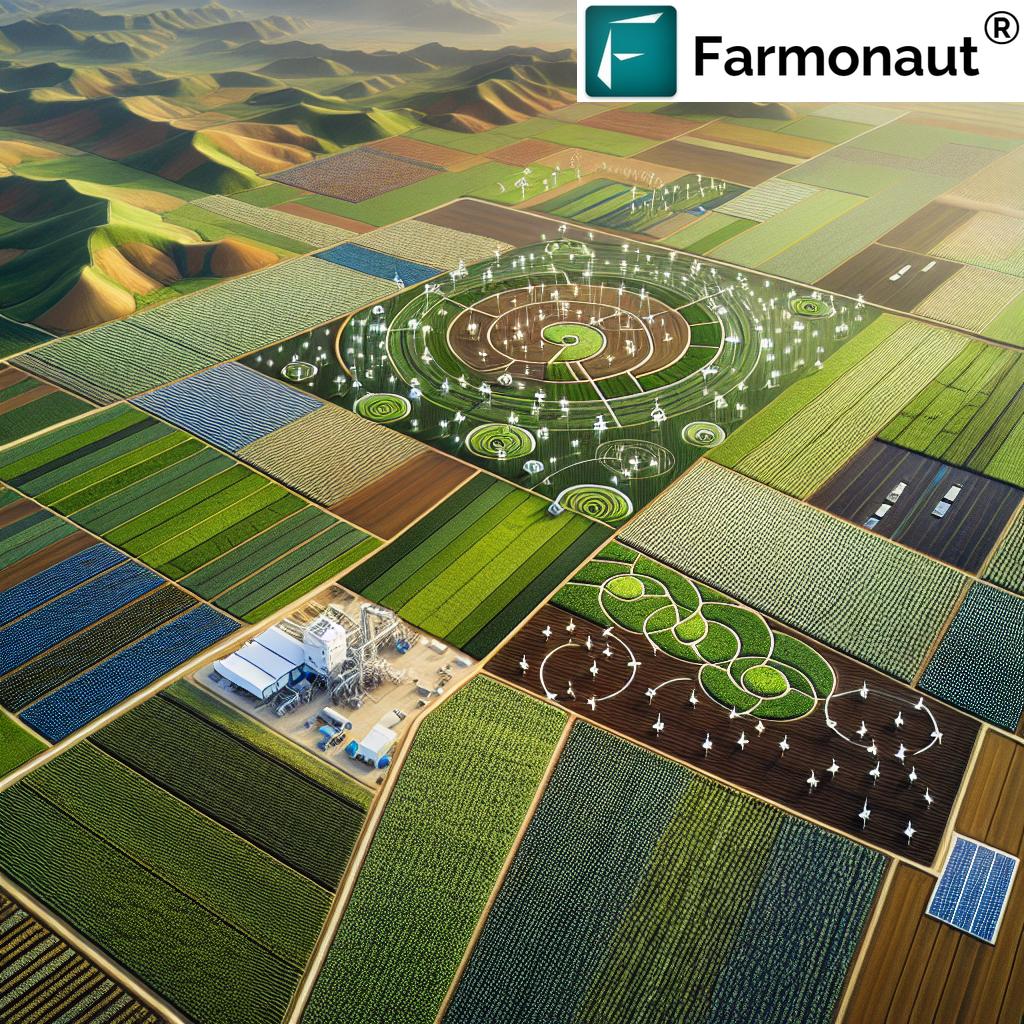
Eco-Friendly Food Packaging: A Sustainable Revolution
As consumers become more environmentally conscious, the demand for eco-friendly packaging solutions is skyrocketing. In 2024, we’re witnessing a significant shift towards sustainable packaging in the food industry:
- Biodegradable Materials: Packaging made from materials like cornstarch, mushroom roots, and seaweed is becoming more common.
- Reusable Packaging Systems: Some retailers are implementing refill stations and returnable container programs to reduce single-use packaging.
- Minimal Packaging Design: Brands are redesigning their packaging to use fewer materials without compromising product protection.
- Plastic Alternatives: Plant-based plastics and other innovative materials are replacing traditional petroleum-based plastics.
While Farmonaut doesn’t directly deal with packaging, its focus on sustainable agriculture aligns with the overall trend towards environmentally friendly practices in the food industry. By promoting efficient and sustainable farming methods, Farmonaut contributes to reducing the overall environmental footprint of food production.
“Sustainable agriculture practices could potentially increase crop yields by 20-25% while reducing environmental impact.”
Agricultural Supply Chain Management: Enhancing Efficiency and Transparency
In 2024, the agricultural supply chain is undergoing a significant transformation, driven by technology and sustainability concerns. Here’s how the industry is evolving:
- Blockchain Technology: Blockchain is being used to enhance traceability and transparency in the supply chain. Farmonaut’s blockchain-based product traceability solution is at the forefront of this trend, enabling consumers to track their food from farm to table.
- IoT and Sensor Technology: Internet of Things (IoT) devices and sensors are being deployed throughout the supply chain to monitor conditions and ensure product quality.
- Predictive Analytics: Advanced analytics are helping to optimize logistics, predict supply and demand, and reduce inefficiencies in the supply chain.
- Sustainable Transportation: The industry is moving towards more sustainable transportation methods, including electric vehicles and optimized routing to reduce carbon emissions.
Farmonaut’s technology plays a crucial role in enhancing agricultural supply chain management. Its satellite-based monitoring system provides real-time data on crop health and growth stages, allowing for more accurate harvest planning and logistics coordination. Additionally, Farmonaut’s blockchain-based traceability solution ensures transparency and builds trust among consumers, retailers, and producers.
The Impact of Precision Farming Technology on Food Production
Precision farming technology is revolutionizing food production in 2024, and Farmonaut is at the forefront of this transformation. Let’s explore how this technology is making a difference:
- Optimized Resource Use: By providing detailed insights into soil health, moisture levels, and crop needs, precision farming technology enables farmers to apply water, fertilizers, and pesticides more efficiently, reducing waste and environmental impact.
- Increased Yields: With access to real-time data and AI-driven recommendations, farmers can make informed decisions that lead to higher crop yields and better quality produce.
- Early Problem Detection: Satellite imagery and AI analysis can detect issues like pest infestations or diseases early, allowing for prompt intervention and minimizing crop losses.
- Climate Adaptation: Precision farming tools help farmers adapt to changing climate conditions by providing accurate weather forecasts and crop-specific recommendations.
Farmonaut’s satellite-based crop health monitoring system exemplifies the power of precision farming technology. By leveraging multispectral satellite images and AI analysis, Farmonaut provides farmers with valuable insights that enable them to make data-driven decisions, ultimately leading to more sustainable and productive farming practices.
Sustainable Food Production: A Holistic Approach
Sustainable food production in 2024 goes beyond just farming practices. It encompasses the entire food system, from production to consumption. Here’s how the industry is adopting a more holistic approach:
- Circular Economy Principles: The food industry is increasingly adopting circular economy principles, focusing on reducing waste, reusing resources, and recycling materials throughout the production cycle.
- Local and Urban Farming: There’s a growing emphasis on local food production and urban farming initiatives to reduce transportation costs and carbon emissions associated with long-distance food transport.
- Alternative Protein Sources: The development and promotion of sustainable protein sources, such as plant-based proteins and cultured meat, are gaining traction as alternatives to traditional livestock farming.
- Biodiversity Conservation: Sustainable food production practices are being designed to protect and enhance biodiversity, recognizing its crucial role in maintaining healthy ecosystems and resilient food systems.
Farmonaut’s technology supports these sustainable food production efforts by providing farmers with the tools they need to implement more environmentally friendly practices. The company’s AI-driven advisory system, Jeevn AI, offers personalized recommendations that help farmers optimize their operations while minimizing environmental impact.
Agricultural Inventory Management: Streamlining Operations
Effective inventory management is crucial for both farmers and retailers in the food industry. In 2024, we’re seeing significant advancements in this area:
- Real-Time Tracking: Advanced IoT sensors and RFID technology enable real-time tracking of agricultural products from farm to store, improving inventory accuracy and reducing losses.
- Predictive Analytics: AI-powered predictive analytics help farmers and retailers forecast demand more accurately, optimizing inventory levels and reducing waste.
- Automated Replenishment: Smart systems can automatically trigger reordering when inventory levels fall below certain thresholds, ensuring consistent stock levels.
- Integration with Sustainable Practices: Inventory management systems are being designed to prioritize sustainable products and practices, aligning with consumer demands for eco-friendly options.
Farmonaut’s platform contributes to improved agricultural inventory management by providing accurate crop yield predictions based on satellite imagery and AI analysis. This information helps farmers plan their harvests more effectively and allows retailers to anticipate supply levels, leading to more efficient inventory management throughout the supply chain.
Climate-Smart Agriculture: Adapting to a Changing World
As climate change continues to pose significant challenges to agriculture, climate-smart farming practices are becoming increasingly important. In 2024, we’re seeing a range of innovative approaches:
- Drought-Resistant Crops: The development and adoption of drought-resistant crop varieties help farmers maintain productivity in water-scarce regions.
- Carbon Sequestration: Farming practices that enhance soil carbon sequestration are gaining popularity as a way to mitigate climate change while improving soil health.
- Agroforestry: The integration of trees and shrubs into crop and animal farming systems is helping to create more resilient and diverse agricultural landscapes.
- Smart Water Management: Advanced irrigation systems and water conservation techniques are being implemented to adapt to changing rainfall patterns and water availability.
Farmonaut’s technology plays a crucial role in supporting climate-smart agriculture. Its satellite-based monitoring system provides farmers with valuable data on changing environmental conditions, enabling them to adapt their practices accordingly. Additionally, Farmonaut’s carbon footprinting feature helps agribusinesses track and reduce their environmental impact, contributing to broader climate change mitigation efforts.
Digital Transformation in Agriculture: Beyond the Farm
The digital revolution in agriculture extends far beyond the farm, impacting every aspect of the food industry. Here’s how digital transformation is shaping the sector in 2024:
- E-commerce Integration: Farmers and small-scale producers are increasingly using digital platforms to sell directly to consumers, bypassing traditional supply chain intermediaries.
- Big Data Analytics: The collection and analysis of vast amounts of agricultural data are enabling more informed decision-making at all levels of the food system.
- Robotics and Automation: From autonomous tractors to robotic harvesting systems, automation is increasing efficiency and reducing labor costs in agriculture.
- Virtual and Augmented Reality: These technologies are being used for everything from employee training to providing consumers with immersive experiences of farm-to-table journeys.
Farmonaut is at the forefront of this digital transformation, offering a comprehensive suite of digital tools for modern agriculture. Its web and mobile apps provide easy access to critical farm data, while its API integration capabilities allow for seamless incorporation of Farmonaut’s technology into other agricultural systems and platforms.
For those interested in exploring Farmonaut’s innovative solutions, you can access their web app here:
For mobile users, Farmonaut’s apps are available on both Android and iOS platforms:
For developers and businesses looking to integrate Farmonaut’s technology into their own systems, the company offers robust API solutions. You can explore the API documentation here: Farmonaut API Developer Docs
Sustainable Agriculture Trends in 2024
| Trend | Description | Estimated Impact on Sustainability | Farmonaut’s Solution |
|---|---|---|---|
| Precision Farming Technology | Use of data-driven insights to optimize resource use and increase yields | High | Satellite-based crop health monitoring system |
| Climate-Smart Agriculture | Farming practices that adapt to and mitigate climate change effects | High | AI-driven advisory system (Jeevn AI) for personalized recommendations |
| Eco-Friendly Packaging | Use of biodegradable and sustainable packaging materials | Medium | Indirectly supports through sustainable farming practices |
| Food Waste Reduction | Techniques to minimize waste throughout the supply chain | High | Optimized crop yield predictions for better harvest planning |
| Blockchain Traceability | Use of blockchain for transparent supply chain management | Medium | Blockchain-based product traceability solution |
The Future of Sustainable Agriculture and Food Production
As we look beyond 2024, the future of sustainable agriculture and food production is both exciting and challenging. The integration of advanced technologies, such as those offered by Farmonaut, with sustainable farming practices is paving the way for a more resilient and environmentally friendly food system.
Key areas of focus for the future include:
- Further Integration of AI and Machine Learning: These technologies will continue to revolutionize farming practices, making them more precise and efficient.
- Expansion of Vertical and Urban Farming: As urbanization increases, we can expect to see more innovative solutions for growing food in urban environments.
- Development of Climate-Resilient Crops: Ongoing research into crop genetics will lead to the development of varieties that can thrive in changing climatic conditions.
- Increased Focus on Soil Health: Recognizing the crucial role of healthy soils in sustainable agriculture, there will be a greater emphasis on soil conservation and regeneration practices.
- Expansion of Precision Agriculture to Smallholder Farmers: Companies like Farmonaut are making precision farming technologies more accessible, potentially transforming small-scale agriculture in developing regions.
As we navigate these changes, the role of companies like Farmonaut in providing innovative, accessible solutions for sustainable agriculture will be more crucial than ever. By leveraging technology to optimize farming practices, reduce environmental impact, and increase food production efficiency, we can work towards a more sustainable and food-secure future for all.
Conclusion: Embracing a Sustainable Future in Agriculture
The agricultural landscape of 2024 is marked by a strong focus on sustainability, technological innovation, and consumer-driven changes. From precision farming technologies to eco-friendly packaging solutions, the industry is adapting to meet the challenges of feeding a growing global population while minimizing environmental impact.
Farmonaut stands at the forefront of this agricultural revolution, offering cutting-edge solutions that empower farmers, enhance productivity, and promote sustainable practices. By leveraging satellite technology, AI, and blockchain, Farmonaut is not just adapting to the changing landscape of agriculture – it’s actively shaping its future.
As we move forward, the integration of sustainable practices and advanced technologies in agriculture will be crucial in addressing global challenges such as climate change, food security, and environmental conservation. The trends and innovations we’ve explored in this blog post are just the beginning of a transformative journey towards a more sustainable and efficient food production system.
For those interested in being part of this agricultural revolution, Farmonaut offers a range of solutions tailored to various needs in the agricultural sector. Whether you’re a small-scale farmer looking to optimize your operations or a large agribusiness aiming to enhance sustainability and efficiency, Farmonaut’s technology can provide valuable insights and tools to help you succeed in the evolving landscape of modern agriculture.
Farmonaut Subscriptions
Frequently Asked Questions
- What is precision farming technology?
Precision farming technology uses data-driven insights to optimize agricultural practices, including irrigation, fertilization, and pest control, leading to increased efficiency and sustainability. - How does Farmonaut contribute to sustainable agriculture?
Farmonaut provides satellite-based crop monitoring, AI-driven advisory systems, and blockchain traceability solutions that help farmers implement more sustainable and efficient farming practices. - What are the benefits of using Farmonaut’s technology for farmers?
Farmers using Farmonaut’s technology can benefit from real-time crop health monitoring, personalized farming advice, improved resource management, and potentially increased yields and profitability. - How does climate-smart agriculture help in adapting to climate change?
Climate-smart agriculture involves practices that increase productivity while adapting to and mitigating climate change effects, such as using drought-resistant crops and implementing water conservation techniques. - What role does blockchain play in agricultural supply chain management?
Blockchain technology enhances transparency and traceability in the agricultural supply chain, allowing consumers to track the journey of their food from farm to table and reducing the risk of fraud.
As we conclude this exploration of sustainable agriculture and Farmonaut’s role in revolutionizing food production, it’s clear that the future of farming is digital, data-driven, and deeply committed to sustainability. By embracing these innovative technologies and practices, we can work towards a more resilient, efficient, and environmentally friendly food system for generations to come.









